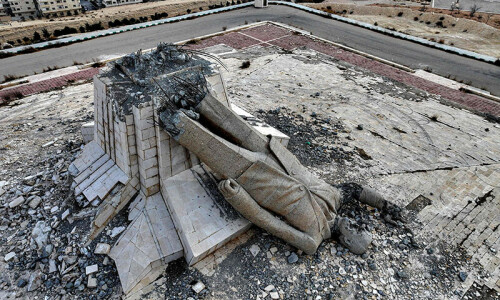Reviewed by Asif Farrukhi
Sometimes they are called newspaper columns and sometimes they are termed op-eds. Call them by whatever name, they remain pretty much the same, part and parcel of what newspapers offer on a daily basis. Pick any newspaper and the editorial page will offer a variety of such columns, written from a purely personal point of view, each packaged with a clearly recognisable silhouette of the writer giving it the appearance of a branded item. On the down side, some of these are no better or worse than the talk shows the idiot-box churns out from an ever expanding number of channels, which all end up sounding alike.
Well-known poet and social activist Kishwar Naheed is among those who have taken to this form of writing. Her columns appear regularly on the pages of a leading Urdu daily but they are now also collected and published in a book, Gumshuda Yaadoon ki Wapsi. Journalism is known to age rapidly and newspaper writing has a brief shelf life, but Kishwar has turned hers into a new collection in the series of such books.
Social issues and political themes are not entirely missing from Kishwar’s poetry. In fact, her verse is rather up to date with the news. She has repeatedly written about events as they are unfolding. She has written about Pakistan’s nuclear programme and directly addressed the Taliban in no uncertain terms.
But she has chosen a different style and approach for her columns. She takes her cue from various news items which may be circulating at any given point and adds her experiences of travel and rubbing shoulders with many notables, although in her vocabulary, notables are those who have strong cultural credentials.
Her own experiences provide not only a constant refrain but also form the basis of some of her pieces, which she utilises for alerting people to social ills. For instance, she writes about going to a bank to deposit a utility bill. The bank teller counts the change and hands over the money to her. It is only later that she realises that the change is short. She wonders how many
people are duped in a similar manner. Another column records her laptop being stolen by a person who comes to clean and sweep her office but she is more vocal about her expectations from the police.
Topical relevance and a sense of immediacy is important to Kishwar in her columns, whether she comments on cultural awards being dished out to undeserving people while more deserving people are left out, or the improper conduct of our parliamentarians. She touches upon the poor implementation of laws about sexual harassment and the need for land reforms to rationalise land holdings.
She writes about the Arts Council organising the Alami Urdu Conference and the Karachi Literature Festival. She writes about music and addresses a letter to Uncle Sam in the same spirit as she describes sipping tea in Jammu. There are comments on books and obituaries for departed figures, sometimes all in the space of a few columns.
Kishwar’s columns are crowded with events, people and opinions. Sometimes her various and varied interests seem to be jostling for attention. Going through the book, one gets the sense of events taking place at a rapid pace and situations unfolding in quick succession. She manages to convey a vivid sense of the present times, with something coming to the forefront and then quickly being replaced by something else which catches the media attention.
At the back of the book Kishwar mentions Chiragh Hassan Hasrat, Ahmed Nadeem Qasmi and Intizar Husain as column writers who defined the social life of their epoch, indicating that she also aspires to a similar reputation.
Many column writers have been known for their literary style or for their sense of humour and satirical wit. Kishwar is neither a stylist in her prose and all together dispenses with the humourous approach. She is interested in social issues and the changes taking place in our society. Her description of people and places is subservient to this overriding feeling. She manages to convey a sense of the times we live in and the critical issues which we face in our country, and this sense is what makes her collection of columns worthwhile, not simply as a document of days bygone but a book of its times.
The reviewer is a writer and critic
Gumshuda Yadoon Ki Wapsi
(COLUMNS)
By Kishwar Naheed
Sang-e-Meel Publications, Lahore
ISBN 9693525442
216pp. Rs600
INTERVIEW
Photo by Tanveer ShahzadWhat makes a poet like you turn to column writing? Are there certain things which you cannot say through your poetry which you want to address through your columns?
If you look around, you will immediately see that there are many current issues which need public attention and these issues require columns and not poetry. I have written directly about social issues in my poems but a poem has its own internal needs. You cannot use a poem for direct comment about everything.
You have referred to Chiragh Hassan Hasrat, Ahmed Nadeem Qasmi and Intizar Husain among your peers. Do such writers provide a model for you? Have you been influenced by some writers?
I have referred to columnists as the history and culture holders of Pakistan. We do not have a complete history of things as they have unfolded in our country. It is column writers such as these who record and preserve things which are overlooked. If these things are not recorded, they will disappear and not a trace will remain.
I have mentioned these writers by name for certain remarkable qualities which they had. Chiragh Hassan Hasrat had stylistic qualities and people used to enjoy his writings; this was probably journalism at its best. Qasmi was a fiction writer and a poet; he would take up serious social and intellectual issues. Intizar sahib discusses literary subjects but when he writes about writers, he is in reality touching upon the intellectual history of our country. I do not believe in acknowledging the buzurgi of my seniors just for the sake of it and neither am I at an age where people take the names of their seniors just to create an impression.
Your columns cover a wide range of subjects from literary events to social norms. What determines your choice of subjects?
I am basically a columnist commenting on society, including reflections on writers. The choice of subjects is not arbitrary even though I write what happens to interest me or arouse passion in my heart. But I like to select what I will write about. I do not write under compulsion or need to cover certain themes.
Column writing, in fact, gives me freedom to write and this is what I relish about it. Also, when I mention certain books, I do so out of a sense of their relevance. I do not like those persons who have a habit of compiling long lists of every book they happen to lay their hands on.
Do you think columns on topical issues have a life beyond the immediate? And should they be preserved in book form?
I did a selection and included those columns which have relevance for times to come. So this book is not a compilation of all the columns I have written or published over a period, but a selection of those which I think are still pertinent. The previous books which I compiled were all done in the same manner.

















































Dear visitor, the comments section is undergoing an overhaul and will return soon.